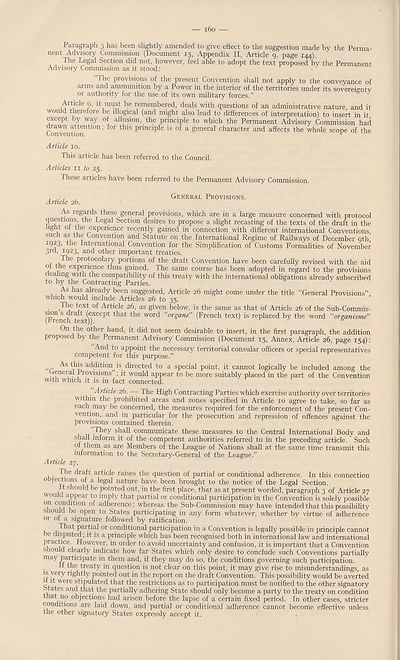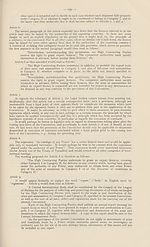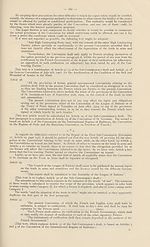Armament > Conference for the control of the international trade in arms, munitions and implements of war
(162)
Download files
Complete book:
Individual page:
Thumbnail gallery: Grid view | List view

— i6o —
Paragraph 3 has been slightly amended to give effect to the suggestion made by the Perma¬
nent Advisory Commission (Document 15, Appendix II, Article 9, page 144).
The Legal Section did not, however, feel able to adopt the text proposed bv the Permanent
Advisory Commission as it stood:
1 he provisions of the present Convention shall not apply to the conveyance of
arms and ammunition by a Power in the interior of the territories under its sovereignty
or authority for the use of its own military forces. ”
Article 9, it must be remembered, deals with questions of an administrative nature and it
would therefore be illogical (and might also lead to differences of interpretation) to insert in it
except by way of allusion, the principle to which the Permanent Advisory Commission had
Convention1111011 ’ ^ thlS principie is of a general character and affects the whole scope of the
Article 10.
This article has been referred to the Council.
Articles 11 to 25.
T hese articles have been referred to the Permanent Advisory Commission.
■ . 7 General Provisions.
Article 26.
As regards these general provisions, which are in a large measure concerned with protocol
questions the Legal Section desires to propose a slight recasting of the texts of the draft in the
igbt ot the experience recently gained in connection with different international Conventions,
sucn as the Convention and Statute on the International Regime of Railways of December 9th,'
1:923, the International Convention for the Simplification of Customs Formalities of November
3rd, 1923, and other important treaties.
, , Protocolary portions of the draft Convention have been carefully revised with the aid
ot the experience thus gained. The same course has been adopted in regard to the provisions
, cabng with the compatibility of this treaty with the international obligations already subscribed
to by the Contracting Parties. ~
As has already been suggested, Article 26 might come under the title “General Provisions”
which would include Articles 26 to 35.
The text of Article 26, as given below, is the same as that of Article 26 of the Sub-Commis-
(Frenchtext))^6^1 tlle WOr<^ “or8ane” (French text) is replaced by the word “organisme”
On the other hand, it did not seem desirable to insert, in the first paragraph, the addition
proposed by the Permanent Advisory Commission (Document 15, Annex, Article 26, page 154):
And to appoint the necessary territorial consular officers or special representatives
competent for this purpose.”
“r a(p^on„ *s. directed to a special point, it cannot logically be included among the
eneral Provisions”; it would appear to be more suitably placed in the part of the Convention
with which it is in fact connected.
Article 26. — The High Contracting Parties which exercise authority over territories
within the prohibited areas and zones specified in Article 10 agree to take, so far as
each may be concerned, the measures required for the enforcement of the present Con¬
vention,. and in particular for the prosecution and repression of offences against the
provisions contained therein.
They shall communicate these measures to the Central International Body and
shall inform it of the competent authorities referred to in the preceding article. Such
of them as are Members of the League of Nations shall at the same time transmit this
information to the Secretary-General of the League.”
Article 27.
The draft article raises the question of partial or conditional adherence. In this connection
o jections of a legal nature have been brought to the notice of the Legal Section.
it should be pointed out, in the first place, that as at present worded, paragraph 3 of Article 27
won d appear to imply that partial or conditional participation in the Convention is solely possible
on condition of adherence; whereas the Sub-Commission may have intended that this possibility
snould be open to States participating in any form whatever, whether by virtue of adherence
or of a signature followed by ratification.
} _..P^a^ Parfial or conditional participation in a Convention is legally possible in principle cannot
ie disputed; it is a principle which has been recognised both in international law and international
practice However, in order to avoid uncertainty and confusion, it is important that a Convention
should clearly indicate how far States which only desire to conclude such Conventions partially
nmy participate in them and, if they may do so, the conditions governing such participation.
If the treaty in question is not clear on this point, it may give rise to misunderstandings, as
is very rightly pointed out in the report on the draft Convention. This possibility would be averted
n it were stipulated that the restrictions as to participation must be notified to the other signatory
Mates and that the partially adhering State should only become a party to the treaty on condition
hat no objections had arisen before the lapse of a certain fixed period. In other cases, stricter
conditions are laid down, and partial or conditional adherence cannot become effective unless
the other signatory States expressly accept it.
Paragraph 3 has been slightly amended to give effect to the suggestion made by the Perma¬
nent Advisory Commission (Document 15, Appendix II, Article 9, page 144).
The Legal Section did not, however, feel able to adopt the text proposed bv the Permanent
Advisory Commission as it stood:
1 he provisions of the present Convention shall not apply to the conveyance of
arms and ammunition by a Power in the interior of the territories under its sovereignty
or authority for the use of its own military forces. ”
Article 9, it must be remembered, deals with questions of an administrative nature and it
would therefore be illogical (and might also lead to differences of interpretation) to insert in it
except by way of allusion, the principle to which the Permanent Advisory Commission had
Convention1111011 ’ ^ thlS principie is of a general character and affects the whole scope of the
Article 10.
This article has been referred to the Council.
Articles 11 to 25.
T hese articles have been referred to the Permanent Advisory Commission.
■ . 7 General Provisions.
Article 26.
As regards these general provisions, which are in a large measure concerned with protocol
questions the Legal Section desires to propose a slight recasting of the texts of the draft in the
igbt ot the experience recently gained in connection with different international Conventions,
sucn as the Convention and Statute on the International Regime of Railways of December 9th,'
1:923, the International Convention for the Simplification of Customs Formalities of November
3rd, 1923, and other important treaties.
, , Protocolary portions of the draft Convention have been carefully revised with the aid
ot the experience thus gained. The same course has been adopted in regard to the provisions
, cabng with the compatibility of this treaty with the international obligations already subscribed
to by the Contracting Parties. ~
As has already been suggested, Article 26 might come under the title “General Provisions”
which would include Articles 26 to 35.
The text of Article 26, as given below, is the same as that of Article 26 of the Sub-Commis-
(Frenchtext))^6^1 tlle WOr<^ “or8ane” (French text) is replaced by the word “organisme”
On the other hand, it did not seem desirable to insert, in the first paragraph, the addition
proposed by the Permanent Advisory Commission (Document 15, Annex, Article 26, page 154):
And to appoint the necessary territorial consular officers or special representatives
competent for this purpose.”
“r a(p^on„ *s. directed to a special point, it cannot logically be included among the
eneral Provisions”; it would appear to be more suitably placed in the part of the Convention
with which it is in fact connected.
Article 26. — The High Contracting Parties which exercise authority over territories
within the prohibited areas and zones specified in Article 10 agree to take, so far as
each may be concerned, the measures required for the enforcement of the present Con¬
vention,. and in particular for the prosecution and repression of offences against the
provisions contained therein.
They shall communicate these measures to the Central International Body and
shall inform it of the competent authorities referred to in the preceding article. Such
of them as are Members of the League of Nations shall at the same time transmit this
information to the Secretary-General of the League.”
Article 27.
The draft article raises the question of partial or conditional adherence. In this connection
o jections of a legal nature have been brought to the notice of the Legal Section.
it should be pointed out, in the first place, that as at present worded, paragraph 3 of Article 27
won d appear to imply that partial or conditional participation in the Convention is solely possible
on condition of adherence; whereas the Sub-Commission may have intended that this possibility
snould be open to States participating in any form whatever, whether by virtue of adherence
or of a signature followed by ratification.
} _..P^a^ Parfial or conditional participation in a Convention is legally possible in principle cannot
ie disputed; it is a principle which has been recognised both in international law and international
practice However, in order to avoid uncertainty and confusion, it is important that a Convention
should clearly indicate how far States which only desire to conclude such Conventions partially
nmy participate in them and, if they may do so, the conditions governing such participation.
If the treaty in question is not clear on this point, it may give rise to misunderstandings, as
is very rightly pointed out in the report on the draft Convention. This possibility would be averted
n it were stipulated that the restrictions as to participation must be notified to the other signatory
Mates and that the partially adhering State should only become a party to the treaty on condition
hat no objections had arisen before the lapse of a certain fixed period. In other cases, stricter
conditions are laid down, and partial or conditional adherence cannot become effective unless
the other signatory States expressly accept it.
Set display mode to:
![]() Universal Viewer |
Universal Viewer | ![]() Mirador |
Large image | Transcription
Mirador |
Large image | Transcription
Images and transcriptions on this page, including medium image downloads, may be used under the Creative Commons Attribution 4.0 International Licence unless otherwise stated. ![]()
| League of Nations > Armament > Conference for the control of the international trade in arms, munitions and implements of war > (162) |
|---|
| Permanent URL | https://digital.nls.uk/195383869 |
|---|
| Shelfmark | LN.IX |
|---|
| Description | Over 1,200 documents from the non-political organs of the League of Nations that dealt with health, disarmament, economic and financial matters for the duration of the League (1919-1945). Also online are statistical bulletins, essential facts, and an overview of the League by the first Secretary General, Sir Eric Drummond. These items are part of the Official Publications collection at the National Library of Scotland. |
|---|---|
| Additional NLS resources: |
|

